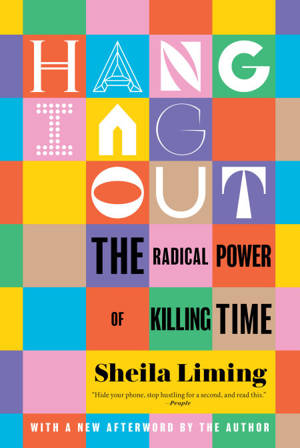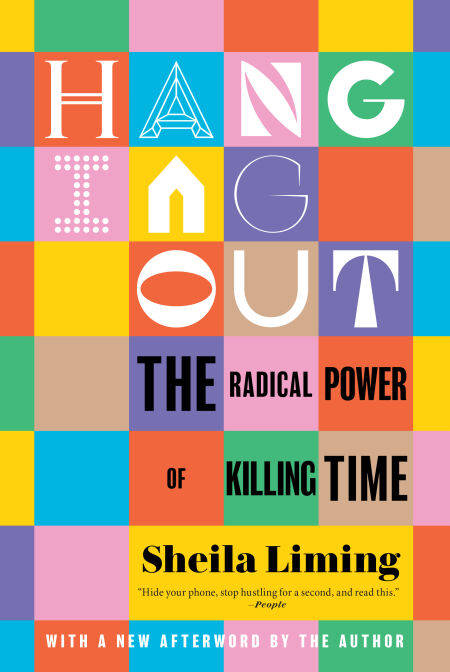
- Retrait gratuit dans votre magasin Club
- 7.000.000 titres dans notre catalogue
- Payer en toute sécurité
- Toujours un magasin près de chez vous
- Retrait gratuit dans votre magasin Club
- 7.000.0000 titres dans notre catalogue
- Payer en toute sécurité
- Toujours un magasin près de chez vous
17,73 €
+ 17 points
Format
Description
"Hide your phone, stop hustling for a second, and read this passionate argument for the importance of unstructured pre-digital hang." —People
Loneliness is an epidemic; it feels harder than ever to connect with others meaningfully. What can we do to remedy this? Sheila Liming has the answer: we need to hang out more.
With the introduction of AI and constant Zoom meetings, our lives have become more fractured, digital and chaotic. Hanging Out: The Radical Power of Killing Time shows us what we have lost to the frenetic pace of digital life and how to get it back.
Combining personal narrative with pungent analyses of books, movies, and TV shows, Sheila Liming shows us how the new social landscape deadens our connections with others — connections that are vital to both self-care and to a vibrant community. Whether drinking with strangers in a distant city or jamming with musician friends in an abandoned Pittsburgh row house, Liming demonstrates that unstructured social time is the key to a freer, happier sense of self.
Hanging Out shows how simple acts of casual connection are the glue that binds us together, and how community is the antidote to the disconnection and isolation that dominates contemporary life.
"The book conceives of hanging out as a way to reclaim time as something other than a raw ingredient to be converted into productivity." —New York Times
“Rich with illuminating stories.” —Slate
"We could all use more of that blissfully unstructured social time, posits Sheila Liming in the well-considered series of arguments found in Hanging Out." —Reader's Digest
"Opens with a simple and expansive account of what hanging out is … Liming dedicates much of the book to stories from her past. She has lived an interesting life, and she tells these stories well.” —Washington Post
"Sharp and vivid writing … a layered exploration of social dynamics that contains some textured literary criticism.” —Bookforum
"More books about hanging out, less about productivity please. Sheila Liming sees the gap in our thinking about time, and the true worth in spending it in an unstructured fashion with members of our community.” —LitHub
Loneliness is an epidemic; it feels harder than ever to connect with others meaningfully. What can we do to remedy this? Sheila Liming has the answer: we need to hang out more.
With the introduction of AI and constant Zoom meetings, our lives have become more fractured, digital and chaotic. Hanging Out: The Radical Power of Killing Time shows us what we have lost to the frenetic pace of digital life and how to get it back.
Combining personal narrative with pungent analyses of books, movies, and TV shows, Sheila Liming shows us how the new social landscape deadens our connections with others — connections that are vital to both self-care and to a vibrant community. Whether drinking with strangers in a distant city or jamming with musician friends in an abandoned Pittsburgh row house, Liming demonstrates that unstructured social time is the key to a freer, happier sense of self.
Hanging Out shows how simple acts of casual connection are the glue that binds us together, and how community is the antidote to the disconnection and isolation that dominates contemporary life.
"The book conceives of hanging out as a way to reclaim time as something other than a raw ingredient to be converted into productivity." —New York Times
“Rich with illuminating stories.” —Slate
"We could all use more of that blissfully unstructured social time, posits Sheila Liming in the well-considered series of arguments found in Hanging Out." —Reader's Digest
"Opens with a simple and expansive account of what hanging out is … Liming dedicates much of the book to stories from her past. She has lived an interesting life, and she tells these stories well.” —Washington Post
"Sharp and vivid writing … a layered exploration of social dynamics that contains some textured literary criticism.” —Bookforum
"More books about hanging out, less about productivity please. Sheila Liming sees the gap in our thinking about time, and the true worth in spending it in an unstructured fashion with members of our community.” —LitHub
Spécifications
Parties prenantes
- Auteur(s) :
- Editeur:
Contenu
- Nombre de pages :
- 256
- Langue:
- Anglais
Caractéristiques
- EAN:
- 9781685890063
- Date de parution :
- 23-01-23
- Format:
- Ebook
- Protection digitale:
- Adobe DRM
- Format numérique:
- ePub

Les avis
Nous publions uniquement les avis qui respectent les conditions requises. Consultez nos conditions pour les avis.






